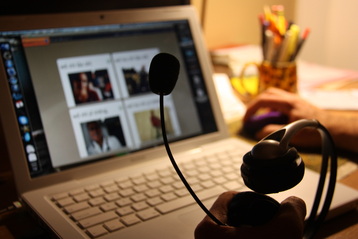
Upon showing this excellent opportunity to my language-learning-impaired husband, I was met with the initial reaction I had fully anticipated: a flat out no. Thus began the process of chipping away at his resistance, but he was more stubborn with this one than I had anticipated. Quite innocently and coincidentally, our friend Gary brought up the sensitive subject by asking if we would try to learn any language basics before traveling to China. I remained silent and let Matt handle a response while I exaggerated a very mature told-you-so expression. From that point on, I did my best to work the language component of our future travels in to casual conversation with everyone we talked to, mostly with encouraging results. My dad quoted a study he read that learning multiple languages correlates to less memory loss with aging. My aunt Ingrid encouragingly noted that any amount of familiarity will only enhance the depth of our experience. Nonetheless, it was not until many tears were shed that I was able to effectively break him down. My show of emotion was not superficial; it was rooted in the fact that I have never traveled to a place where I lacked the ability to have some level of verbal communication. I could easily communicate in English during my first experience abroad in East Africa, I felt comfortable with speaking Spanish by the time I traveled in Central and South America, and Icelanders speak better English than we do. The thought of being surrounded by over a billion people that we could only do charades with is genuinely intimidating to me.
At literally the eleventh hour on December 31st, as we were celebrating with the excellent homebrews of our friends Nate and Heidi (as well as them), we hit the buy button for levels one through five of the Mandarin course as the end of the sale was eminent. I was elated. Matt remained skeptical. Three weeks later, an ad popped into my Facebook news feed: "MLK Day sale for all Rosetta Stone courses!" and to add insult to injury, it was slightly cheaper too. This was followed by a Valentine's Sale and a Spring Sale and so on and so forth. Apparently, Rosetta Stone is on sale more often than it isn't. Who knew? (Not me, I swear.) And each time we see an ad, my lovely husband remains silent, but still responds with a hauntingly familiar told-you-so expression.
But the question remains, will he get to use that expression when we arrive in China? Since I am an eternal optimist by no fault of my own (like father, like daughter...), I believe the verdict is still out. With countless hours invested, we are but half way through level one of five. In that time, we have covered some really useful travel vocabulary such as “goldfish” and “flower.” We can also understand complex sentences such as, “The cat is under the bed,” and “The apple is on the computer.” No doubt, this will be immensely more helpful than knowing how to say, "Which road is better?" or "How much does it cost?" We almost gave up when we learned that "a bicycle" is "yi liang zìxíngchē."
Beyond word comprehension, pronunciation is another matter all together. According to our Lonely Planet China guidebook, "Mandarin is a language with a large number of words with the same pronunciation but a different meaning. What distinguishes these homophones is their 'tonal' quality--the raising and lowering of pitch on certain syllables. Mandarin has four tones--high, rising, falling-rising and falling, plus a fifth 'neutral' tone that you can all but ignore." Even ignoring one tone and Chinese characters all together, we still have to deal with the reality that "mā" means mother, "má" means hemp as well as numb, "mǎ" means horse, and "mà" is scold. Super. I am so relieved to know that I might try to say "mother" or "horse" and inadvertently end up scolding someone…or just by saying "ma" in different tones, you can ask, "Did mother scold the horse?" That would be: "mā mà mă ma?"
By the way, this tonal influence only results in 1200 possible syllables, a factoid which Rosetta Stone shares without the least bit of remorse. Based on the low scores of our "speaking assessment software," we are far from mastering those important nuances of tone. However, while a native Mandarin speaker may have no clue what we are trying to convey, we seem to understand each other’s pronunciation just fine. So maybe Matt is right...Rosetta Stone may not make us fluent in Mandarin, but it will give us the opportunity to develop a secret language only the two of us can understand…We’ll call it Kohnese.
On the other hand, we recently gave a lift to young man from Hong Kong who was trying to find the Headlands Hostel and shared our upcoming plans with him (in English). As he was getting out of our car, he asked if we knew any Chinese. We both froze, staring at each other, then between the two of us managed to blurt out, “Hello! One, two, three, a cat. Goodbye!” The exciting part was when he responded, “Hen hao.” We knew that he said, “Very good.” So maybe there is hope for us after all. Either way, learning how to say "I told you so" would certainly come in handy for this traveling couple.

 RSS Feed
RSS Feed
